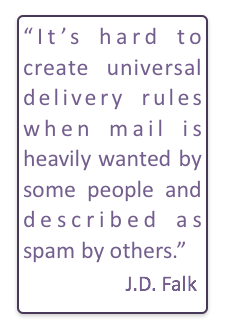Deliverability and IP addresses
Almost 2 years ago I wrote a blog post titled The Death of IP Based Reputation. These days I’m even more sure that IP based reputation is well and truly dead for legitimate senders.
There are a lot of reasons for this continued change. 
Improved computing power
I touched on the increase in computing power in my 2013 post. The power and the complexity of filters in even greater now than then. Filters can sort through all sorts of variables faster than ever. They’re now fast enough to keep up with the high volume of email received at most incoming servers.
Planning for IPv6
In a world with 340 trillion trillion trillion IP addresses IP based reputation isn’t going to work very well. We’re not yet at the point where a lot of email is going out over IPv6, but many people are working on filtering already. When a spammer can use an IP per email, IPs are just not useable for blocking email. The smart folks who develop and maintain spam filters are planning ahead and developing technologies that don’t rely on the IP address. These technologies are being developed on current IPv4 infrastructure, and we’re seeing the effects.
Consumer demand
Years ago I was sitting in a meeting talking with a lot of very smart people about filtering. During the discussion a representative from Yahoo! mentioned that it was hard to make global decisions about email when some people really wanted it and some people really didn’t want it. Consumers want the email they want and they don’t want email they don’t want. This demand has helped drive filters away from the all or nothing approach.
Better anti-spam programs
Spam and other types of malicious emails are a global problem. Criminals are using email to gain access to individual computers and using that access to launch bigger compromises. Many of the major compromises over the past few years started with email, including Target, The Oak Ridge National Laboratory, ICANN and even the RSA. Over the past few years filtering companies and organizations have worked closely with law enforcement across the world. These groups have identified and removed a number of criminal gangs from the internet, and even society. In addition to the legal work being done, many legitimate ISPs and network providers police and disconnect spammers and other email abusers. Overall, the effect is to restrict truly bad senders and criminals away from legitimate IPs. We now have bad IP neighborhoods and good IP neighborhoods. Senders in good IP neighborhoods see less IP blocking than senders in bad IP neighborhoods.
Better communication and partnerships
Filtering companies, ESPs, ISPs and large senders are working together on the spam problem. M3AAWG is part of that by simply giving diverse groups a place to talk, interact and develop relationships. These relationships were tentative at first, but continue to develop. M3AAWG is not the sole reason for the increase in cooperation. A number of individuals, on both the sending and the filtering side, took a risk and reached across the divide to work together. These relationships have changed how filters look at senders and how senders look at filters. This leads to less abuse and less need for IP based filtering.
Domain based authentication
Technologies like DKIM and SPF and DMARC have given filters and ISPs the ability to trust more data than the connecting IP address. These frameworks provide other data points that can be trusted. Trusted data can be used for reputation and that reputation can be used to filter email.
IP reputation was always a big, big club. It could affect lots of email from different senders (think shared IPs at an ESP or an ISPs outgoing servers). But most IPs don’t send all good email or all bad email. Most IPs send mixed email, and IP based reputation is really bad at dealing with that.
Newer filtering technologies mean that IP reputation isn’t as important for deliverability as it used to be. IP reputation is important for the SMTP transaction, and it will always be. There are too many “blackhat” IPs for blocking to go away completely. But once a receiver has accepted an email the IP reputation has done its part for delivery. The receiver knows that the email is coming from an IP with a minimum reputation. All the other reputation factors (domains, links, content, images) influence where that email ends up.
We don’t need the IP club any more. This is good news for good senders. Deliverability now depends more on that specific email and that specific recipient than the IP the message was sent from. This means senders really can focus more on meeting the needs of their recipients and less time worried about the health of their sending IP.
